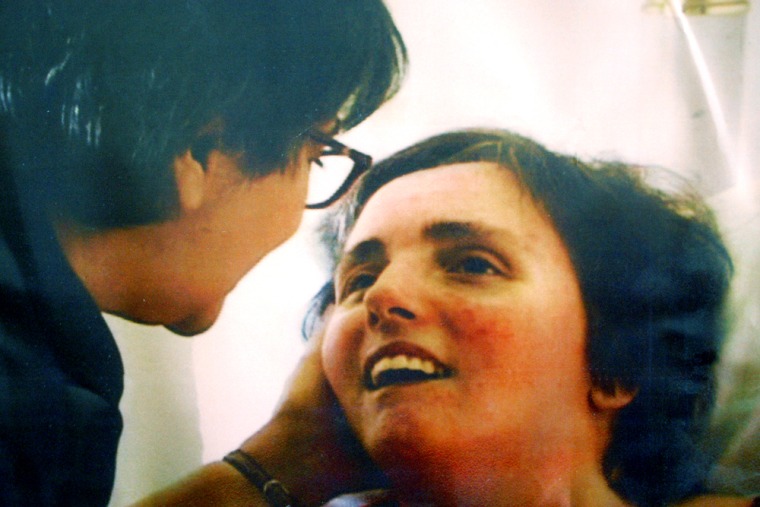The Supreme Court refused Monday to reinstate a Florida law passed to keep a severely brain-damaged woman hooked to a feeding tube. The order clears the way for the feeding tube to be removed, but other litigation arising from the case will prevent any immediate change in her status, lawyers in the case say.
The Florida Supreme Court had struck down the law last fall, and the justices were the last hope for state leaders who defended the law in a bitter long running dispute over the fate of Terri Schiavo.
Her husband, Michael Schiavo, contends she never wanted to be kept alive artificially. But her parents told justices in a filing that their son-in-law is trying to rush her death so he can inherit her estate and be free to marry another woman.
Appeal rejected without comment
The Supreme Court did not comment in rejecting an appeal from Gov. Jeb Bush, who argued that the state had the authority to step in and pass the 2003 law that ordered Terri Schiavo's feeding tube reinserted six days after her husband had it removed.
The order sends the case back to state Judge George Greer, who already has ruled that the brain-damaged woman’s husband could withdraw her feeding tube. Although several legal challenges are pending, the Supreme Court was considered the best hope to stop the removal of the tubes.
“It’s judicial homicide. They want to murder her,” her father, Robert Schindler, said Monday. “I have no idea what the next step will be. We’re going to fight for her as much as we can fight for her. She deserves a chance.”
The case was one of two right-to-die appeals pending at the high court. Justices are expected to decide in the next month whether to consider a Bush administration request to block the nation's only law allowing doctors to help terminally ill patients die more quickly. Oregon voters passed that law in 1998.
At issue Monday was "Terri's Law," which the Florida Supreme Court ruled unanimously was an unconstitutional effort to override court rulings.
The 41-year-old Schiavo suffered brain damage in 1990 when her heart temporarily stopped beating because of an eating disorder. In 2001, her parents lost an emergency Supreme Court appeal seeking to keep her feeding tube in place, but more appeals followed.
Florida judges will now decide, after the Supreme Court's action, what happens next in the case.
Terri Schiavo has lived in nursing homes. She can breathe on her own but depends on a feeding tube to stay alive because she cannot swallow on her own. She left no written directive.
Other legal motions cloud outlook
George Felos, the attorney for Michael Schiavo, was hesitant to predict if pending legal motions would mean Terri Schiavo is kept alive for weeks, months or longer.
"The only issue here is when the courts are going to summon up the resolve to say, 'No more. We're not going to put up with these frivolous motions and give stays and permit any other delays,"' he said.
Jay Sekulow, the American Center for Law and Justice chief counsel who represented the Schindlers at the Supreme Court, said: "While there are still legal options available in Florida, the Supreme Court's refusal to take the case makes it more difficult for those legal options to prevail."
Issues in dispute are whether she is in a persistent vegetative state with no chance of recovery, and if she had said before her illness that she did not want to be kept alive by machines.
Washington attorney Robert Destro, representing Florida, told justices to consider “the most vulnerable of our citizens who cannot speak for themselves.”
Michael Shiavo did not file any arguments with the court, but his attorney had accused Florida leaders of engaging in delaying tactics to prevent Terri Schiavo from carrying out her right to die.
The case is Jeb Bush v. Michael Schiavo, 04-757.
In another action Monday, the court:
- Asked federal courts Monday to
- Declined to consider whether states may offer plates with anti-abortion messages, leaving lower courts divided over whether the programs in a dozen states unconstitutionally restrict dissenting views. Without comment, justices let stand a lower court ruling that said South Carolina's license plates, which bear the slogan "Choose Life," violate the First Amendment because abortion rights supporters weren't given a similar forum to express their beliefs.
Ruled 6-2 in an Illinois case that when police use
Chief Justice William Rehnquist, who has been undergoing treatment for thyroid cancer, was not on the bench Monday as the rulings and orders were announced.
